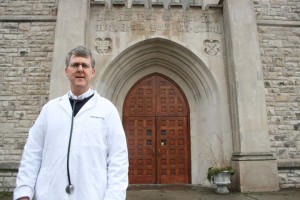A young woman entered the office of Dr. Carnie Nulton, hoping he would prescribe her birth control pills, daily medication which regulates a woman’s menstrual flow and reduces the likelihood of pregnancy. This young woman was not the first to ask Nulton for contraceptive pills that month and she probably was not the last.

Nulton sat down across from the woman and explained that he wants what is best for her and her sexual partner, but that it is not in their best interest to use artificial contraception, or unnatural means of preventing childbirth. He assured her that he does not judge her for her situation and encouraged her to think about her desire to use birth control.
After the conversation, the woman thanked Nulton and left his office without the prescription, not unlike the other women who have asked and will continue to ask Nulton for contraceptive medication.
According to Nulton – who is father of alumnae Mary and Sally and sophomore Meg Nulton – this scenario is fairly routine at Westwood Internal Medicine on Shawnee Mission Parkway where he has been practicing for two-and-half out of his 25 years as a physician. Nulton made the decision over a decade ago to not prescribe birth control pills or any other form of contraception due to his Catholic beliefs. However, there was a time when Nulton did not have these beliefs.
‘Early on in my practice, I prescribed birth control pills and it’s honestly not something I am proud of,’Â Nulton said.
Sixteen years ago, Nulton’s views began to evolve and after several years, his opinions were in full accordance with Catholic teaching.
According to Ms. Adrienne Doring, former Director of the Right to Life Office of the Diocese of Kansas City-St. Joseph, the Catholic Church believes that ‘it is wrong to use contraception to prevent new human beings from coming into existence.’Â
‘The Church opposes all forms of contraception,’Â Doring said. ‘Contraception is in violation to God’s design for the human race, often referred to as ‘Ëœnatural law.’ The natural law’s purpose of sex is procreation, and contraception thwarts that.’Â
Nulton has developed his personal opinion on contraception from this Catholic teaching.
‘I’m a Catholic, and as such I believe in the sanctity of life,’Â Nulton said. ‘I believe in the sanctity of marriage. I believe in the sanctity of the marital act.’Â
According to Nulton, the marital act refers to sexual intercourse, but with a deeper connotation.
‘I believe that the marital act has two wonderful purposes,’Â Nulton said. ‘One is unitive, which basically means to bring the couple together and enhance their love with one another. The other is procreative, which, to me, means that together with God, the couple has the opportunity to co-create new life.’Â
Nulton feels birth control pills prevent these two purposes.
‘Clearly [birth control] gets in the way of procreation; that’s the whole purpose of it,’Â Nulton said. ‘I think it gets in the way of uniting the couple, because the couple is not saying ‘ËœI give myself to you completely.’ Instead they are saying ‘ËœWell you know, I’m not really committing myself to this act.’ There is a barrier there.’Â
Not only does Doring believe Nulton is doing the right thing by taking his religious beliefs to work with him, but so does his daughter Sally, freshman at the University of Kansas.
‘I am proud of my dad for standing up for what he believes in,’Â Sally said. ‘My dad will always do what he believes is right, no matter what. Even if it means that his patients might not want to be his patients anymore, he is not going to jeopardize his beliefs just to please someone else.’Â
Along with the contraceptive purpose, women commonly use birth control pills to regulate their menstrual cycle. According to an article on the American Life League website by Dr. Paul Hayes, using birth control for ‘medical reasons’Â is acceptable under Catholic teaching only if their is no possibility of a contraceptive effect.
‘If a woman is not sexually active, thus eliminating the contraceptive aspect of the birth control pill, there would be no wrong committed,’Â Hayes said. ‘It is the contraceptive effect of these medications that are not permitted, not the drugs that are in them.’Â
Nulton, Sally and Doring agree with Hayes.
‘Say a teenager plays basketball and gets cramps,’Â Doring said. ‘She doesn’t want the cramps to inhibit her athletic ability, so she goes to the doctor, and he prescribes birth control. Or, if you’re like me, you struggle with acne. Doctors often prescribe birth control for that, too, as if there is no other way to control these things than by cutting off fertility. There is nothing inherently wrong with a woman taking birth control for medical reasons as long as she abstains from intercourse while she is on the pill to avoid the pill potentially working [to prevent a newly conceived human embryo from implanting in its mother’s womb].’Â
According to Nulton, he wholeheartedly agrees with Doring’s views and he has not prescribed birth control pills for over a decade due to the confusion between medical and contraceptive intentions.
Despite the support Nulton receives from the Church and his family, his steadfast values have drawn some scorn from other medical professionals.
‘There have been people who have criticized me, but with those people who have criticized me directly, we have had the opportunity to share our feelings and understand where one another is coming from and respectfully disagree,’Â Nulton said. ‘I think that in those situations, they came away with a good understanding that my decision to not promote contraception is a well-thought out and well-formulated decision and that there is a lot of validity to that recommendation.’Â
Despite these criticisms, Nulton stands by his beliefs in the workplace and according to Sally, he and his wife Maura have succeeded in extending their religious values to their eight children.
‘My parents have always taught us that the Catholic teachings are the true teachings, but I have never felt that my parents are forcing anything upon me,’Â Sally said. ‘[My dad’s dedication to his beliefs] shows how strong his faith is in the Catholic Church. I think that’s why I respect my parents so much and why I have had such a good experience growing up Catholic, beause my parents know what they believe and have taught me to stand strong for my convictions and my morals.’Â
‘There have been people who have criticized me, but with those people who have criticized me directly, we have had the opportunity to share our feelings and understand where one another is coming from and respectfully disagree,’Â Nulton said. ‘I think that in those situations, they came away with a good understanding that my decision to not promote contraception is a well-thought out and well-formulated decision and that there is a lot of validity to that recommendation.’Â
Despite these criticisms, Nulton stands by his beliefs in the workplace and according to Sally, he and his wife Maura have succeeded in extending their religious values to their eight children.
‘My parents have always taught us that the Catholic teachings are the true teachings, but I have never felt that my parents are forcing anything upon me,’Â Sally said. ‘[My dad’s dedication to his beliefs] shows how strong his faith is in the Catholic Church. I think that’s why I respect my parents so much and why I have had such a good experience growing up Catholic, because my parents know what they believe and have taught me to stand strong for my convictions and my morals.’Â





Sydney Deatherage • Feb 3, 2010 at 3:53 pm
Should religion enter the workplace?